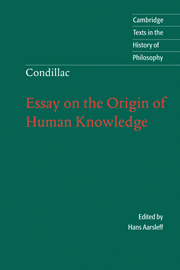Book contents
- Frontmatter
- Contents
- Acknowledgments
- List of abbreviations
- Introduction
- Chronology
- Further reading
- Note on the text and translation
- Essay on the Origin of Human Knowledge
- Introduction
- PART I The materials of our knowledge and especially the operations of the soul
- Section 1
- Section 2 Analysis and generation of the operations of the soul
- Section 3 Simple and complex ideas
- Section 4
- Section 5 Abstractions
- Section 6 Some judgments that have been erroneously attributed to the mind, or the solution of a metaphysical problem
- PART II Language and method
- Index
- Cambridge texts in the history of philosophy
Section 4
Published online by Cambridge University Press: 05 June 2012
- Frontmatter
- Contents
- Acknowledgments
- List of abbreviations
- Introduction
- Chronology
- Further reading
- Note on the text and translation
- Essay on the Origin of Human Knowledge
- Introduction
- PART I The materials of our knowledge and especially the operations of the soul
- Section 1
- Section 2 Analysis and generation of the operations of the soul
- Section 3 Simple and complex ideas
- Section 4
- Section 5 Abstractions
- Section 6 Some judgments that have been erroneously attributed to the mind, or the solution of a metaphysical problem
- PART II Language and method
- Index
- Cambridge texts in the history of philosophy
Summary
This operation is the result of the imagination, which presents signs to the mind as yet ignorant of their use, and of the attention which links them to ideas. This operation is one of the most essential in the search for truth, though it is among the least known. I have already shown the use and necessity of signs for the exercise of the operations of the mind. I shall now demonstrate the same thing with regard to the different kinds of ideas; this is a truth that cannot be presented from too many different points of view.
§I Arithmetic is the most evident example of the necessity of signs. It would be impossible to make any progress in the knowledge of numbers if, after giving a name to the concept of unity, we did not successively keep unity in mind for all the ideas we form by the multiplication of this first one. We discern different collections only because we have digits that are themselves very distinct. Take away these digits, abolish the use of signs, and we will discover that it is impossible to preserve the ideas. Can we even have a notion of the smallest number without considering several objects each of which is, as it were, the sign to which we attach the unit? As for myself, I do not perceive the numbers “two” and “three” unless I represent for myself two or three different objects.
- Type
- Chapter
- Information
- Condillac: Essay on the Origin of Human Knowledge , pp. 78 - 91Publisher: Cambridge University PressPrint publication year: 2001



